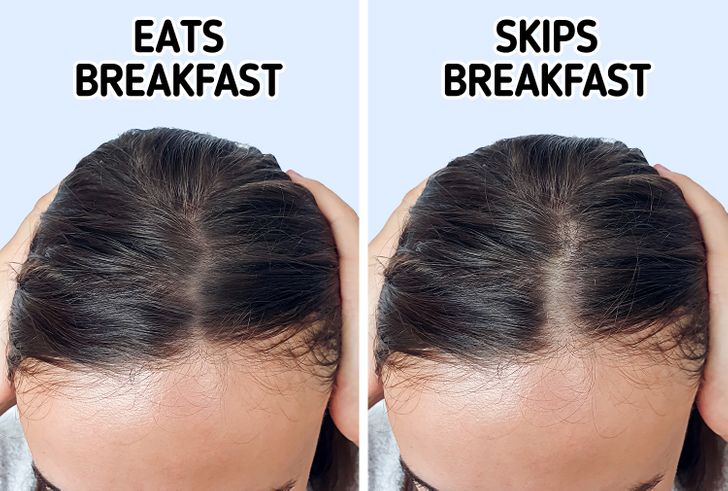Table Of Content

A doctor can perform a blood test to determine if you have iron-deficiency anemia and do a red blood cell count. If so, it can all simply be too much for your hair, warns Dr. Peredo. Even excessive pulling, touching, and stress-twirling strands around your finger can cause tension that leads to thinning. In women, hair may thin all over the head, but the hairline won't recede. In men, hair will begin thinning at the crown and the hairline will recede.
Try an OTC Thickening or Regrowth Product
On the whole, it’s important that you speak with your doctor about any symptoms you’re experiencing. A dermatologist can provide a proper diagnosis, and select a personalized treatment that will help restore health to you hair and scalp. Alopecia areata is an autoimmune condition that is characterized by “round patches of hair loss on the scalp,” although it can occur elsewhere on the body, Agbai says. While the exact reason for this type of hair loss is unknown, it is generally understood that “the immune system mistakenly attacks hair follicles, leading to hair loss,” she adds.
I’m Victoria Beckham’s hairstylist – your middle parting is the reason your locks look thin and why to ditch masks ASAP
An iron deficiency seems like an unusual reason for hair loss, but women can “absolutely” have hair loss while struggling with this, Dr. Goldberg says. Women who have heavy periods or don’t eat enough iron-rich foods may be prone to iron deficiency, in which your body doesn’t create enough hemoglobin, a protein that transports oxygen to the tissues in your body. In turn, your red blood cell count drops quickly, zapping your energy.
12 Best Shampoos For Hair Thinning And Loss, Per Dermatologists And Editors - Women's Health
12 Best Shampoos For Hair Thinning And Loss, Per Dermatologists And Editors.
Posted: Tue, 23 Apr 2024 07:00:00 GMT [source]
Medical Conditions
While deficiencies in these vitamins can contribute to hair issues, it's essential to address any deficiencies with your healthcare provider. They can evaluate your nutritional status and recommend appropriate supplements or dietary changes to support overall health and potentially improve hair health. Thinning hair can grow back depending on what caused it to thin in the first place. People who experience thinning hair due to nutrient deficiencies, stress, pregnancy, and other nongenetic reasons could experience regrowth. Any number of lifestyle factors, genetics, recent life events (such as extreme weight loss in a short period of time or giving birth), or medical conditions can cause your hair to thin.
When to contact a doctor
But if you notice your hair is looking thinner than usual, it could be the result of factors like aging, a health condition, medication, or high stress levels. Fortunately, there are treatments and at-home remedies available that can help stop or slow down hair thinning or to make your hair look thicker. According to Agbai, genetics, hormonal shifts, stress, underlying medical conditions, nutritional deficiencies, and scalp inflammation are notable factors. If you have a family history of fine, thin hair, then it may be a fact of life for you and your family.
Ferritin deficiency most certainly can cause a shortened hair growth cycle. In these cases, an iron supplement can be instrumental in restoring healthy hair growth. 'It is a reactive hair loss caused by an internal imbalance or shift.
This may appear as scaling and flaking along the hairline, along with what appears to be small bumps around the hair follicle, Dr. Rodney says, which are the result of inflammation around the hairline. If caught early enough, the hair should grow back, Dr. Rodney says. But if it continues for years, “the hairs won’t grow back.” A doctor's examination or biopsy can help differentiate this from other types of alopecia, Dr. Agbai says. In fact, it’s getting more and more common,” says Gary Goldenberg, M.D., assistant clinical professor of dermatology at the Icahn School of Medicine at Mount Sinai in New York City. If that's the case, a weather-induced hair die-off could hasten that male- or female-patterned thinning as new hairs come back smaller or not at all, he says. So if baldness runs in your family, or if you notice an increased rate of loss when baldness was already a concern for you, see your doctor.

My thinning hair story
About 10 million people in the United States are iron deficient, per one 2013 review of research, and it’s more common in women than men. Hair, nails, and skin may become more brittle and break more easily. Hyperthyroidism (too much hormone) is less common than hypothyroidism but may cause inexplicable weight loss, heart palpitations, nervousness, irritability, diarrhea, moist skin, and muscle weakness. Both much or too little thyroid hormone can affect your hair follicles, resulting in hair loss.
You'll also want to avoid drinking tea when consuming multiple vitamins containing Iron since tannins in those beverages can alter their absorption into the body's system. Understanding the underlying cause of your hair loss is absolutely necessary in determining the best approach to halt and reverse any further damage to your hair and scalp. Stress can cause your hair to thin, according to Mayo Clinic psychiatrist Daniel K. Hall-Flavin. Once you regain some peace in your life, the hair likely will begin to grow again, although it may take months, Hall-Flavin notes.
Proteins, fats, and certain vitamins and minerals are important for hair health. In chronic cases, shedding may continue, but a person will usually retain a reasonable head of hair. While you may be focused on reversing thinning hair, it’s also important to try to practice good hair care techniques. To help manage stress, it’s important to take some time for yourself, whether it’s a meditation session or a relaxing hobby you enjoy. You may also consider talking with a therapist if you’re having a difficult time with chronic stress. While stress is a natural part of life, long-term stress can do damage to your health — including your hair.

Add Pantene Pro-V Miracles Roots Awakener, infused with bamboo, biotin and caffeine, to your hair routine and massage into roots to create the ultimate environment for improved hair growth. The individual strands of hair may be thin as well as the overall volume of hair strands. Genetics, aging, medical conditions, and lifestyle factors can cause thinning hair. To help boost hair growth and fullness, options include hair care and lifestyle adjustments, topical treatments, and prescription medications or procedures recommended by a healthcare provider. Traction alopecia is the result of environmental factors, such as wearing your hair in tight hairstyles, Agbai says. Telogen effluvium refers to the excessive shedding of hair follicles, and it occurs when hair follicles prematurely skip to the end of the hair growth cycle, she adds.
Using too many chemical processes or styling your hair roughly with heated styling tools can also lead to thinning, especially for those prone to fine, weak hair. A dip in hair-growth-promoting hormones oestrogen and progesterone, paired with a spike in hair-loss-promoting hormones androgen and testosterone, flicks a switch to send all hairs into the telogen phase. These are prescription-only medications, which can be taken orally or applied topically to your scalp. They work by helping to block dihydrotestosterone (DHT), a hormone that can trigger hair thinning in people who have a genetic sensitivity to it. This procedure is when your blood is drawn and then placed into a machine to separate the red blood cells from plasma. This plasma—which is “rich in platelets that contain growth factors,” per the AAD—is then injected into the hair follicles directly.
‘If you’re not breastfeeding, try minoxidil,’ says Trisha Buller, a trichologist at Ciente Salon. ‘It’s the only drug that has medical backing to speed the process of hair growth.’ It works by increasing the blood flow to hair follicles, stimulating the growth phase. PCOS can cause facial hair growth, irregular periods, acne, and cysts on the ovaries. And while you may experience hair loss on your scalp, you may notice more hair elsewhere on the body, Dr. Fusco says. A doctor can take a blood test to look for elevated levels of testosterone and DHEAS (dehydroepiandrosterone), a product of testosterone. "Sudden thinning hair can be a symptom of anemia (low red blood cell count), hormonal issues especially related to events like pregnancy, or a thyroid disorder, which are all very common in women," says Dr. Peredo.













